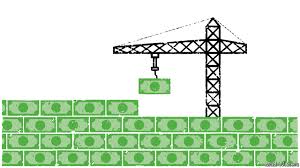How to plug budget holes by managing public wealth better

PROPONENTS OF sovereign-wealth funds like to say that returns from publicly owned assets could in theory displace taxes. In countries that have not struck oil, however, the chance of politicians building up savings rather than running up debt seems remote. Yet states may not need to save in order to enable at least some tax-free spending. Most already have plenty of assets. The problem is that they do not sweat them hard enough.
Most public wealth falls into one of four categories: land and natural resources; property and infrastructure, such as ports and roads; public firms, such as utilities and state-owned airlines; and financial assets like those held by public pension funds. In estimates covering 31 economies released on October 10th, the IMF put the total stash at $ 101trn, or 219% of GDP.
The Fund’s estimates of governments’ assets and liabilities cast their fiscal health in a new light (see chart). Several rich countries’ governments have negative net worth, partly because of massive pension obligations to retired public employees. The picture would look still worse if the estimates included state pensions and other promises to ageing populations, such as to provide health care.
Although it is rarely quantified, investors are not oblivious to such risk. The IMF finds some evidence that government-bond yields respond to the health of public-sector balance-sheets, as well as to debt and deficits.
But a bigger point is that, with so many assets on the books, it would take only a small increase in yields to raise a lot of money. Dag Detter, a consultant who has co-written a book on the subject, says that increasing the return on public assets by a mere 2% would enable governments worldwide to double the amount they spend on basic infrastructure.
What would it take to make that happen? The yields for society from some assets, such as national parks, are non-monetary. Turning schools and hospitals into cash-cows seems implausible. Yet there are plenty of examples of inefficient government use, in particular of land. Mr Detter and his co-author point to Boston’s Logan International Airport, which sits on prime waterfront and could be moved inland. Even schools can be put in better or worse places. One of Rio de Janeiro’s sits on the Copacabana beach-front, wedged between pricey hotels. Putting it somewhere else and charging a market rent for the site could create new revenue for the education budget. A recent review found that 166 of the roughly 230 trusts making up England’s National Health Service report owning land they do not need.
Some countries seem to get much more from their balance-sheets than others. Take financial assets. The IMF calculates that a country moving from the 25th to the 75th percentile for risk-adjusted returns would raise 2% of GDP in new revenue (it spares policymakers’ blushes by keeping the leaders and laggards anonymous). Boosting returns might involve pooling investment portfolios in order to reduce fees; charging more for being an insurer of last resort, for example for bank deposits or flooding; and using offices and other types of property better.
Improving the profitability of public firms—think of post offices and the like—could raise another 1% of GDP, the IMF says. Middling government-run firms produce average returns of 1.9%, but better ones manage 4.3%—which is still only half the level of companies in the private sector. Some state-owned firms do much better. SNCF, France’s public-sector railway, earned a return on capital of 7.9% in 2017.
For many physical assets, the first step is working out the value of what is on the books. That is not always easy, because governments are bad at keeping track of their balance-sheets. Assets, such as the land on which Boston’s airport is built, often linger at historical cost rather than market value. But some countries are making progress. Since 2011 Britain has produced “whole-of-government accounts” that follow international accounting standards. They show assets of £1.9trn ($ 2.5trn or 96% of GDP). The government is combing through its balance-sheet to find ways to boost returns; it will report the results in its budget on October 29th.
Often, improving yields will mean selling things off. But without at least some effort to improve those yields first, it is hard to tell whether the price is right. Anyone sceptical of privatisation can point to some disastrous deals, like Chicago’s leasing in 2008 of its parking meters to a consortium at a price that, according to a later report by the city’s inspector-general, was almost $ 1bn too low. In 2014 a British parliamentary committee found that Royal Mail, the state-owned postal service, had been sold off too cheaply the year before. Its shares rose by 38% on the first day of trading.
Finance ministers may be more concerned with making up shortfalls in cashflow than getting a good deal. If governments keep an eye on net worth, shown on a balance-sheet, as well as on the debt-to-GDP ratio, then politicians would be less likely to sell assets too cheaply. And they would be more likely to keep a keen eye on their liabilities other than government debt.
The IMF argues that such an approach to fiscal policy is overdue. It has been wholeheartedly adopted only by New Zealand, which updates its balance-sheet monthly, and where the figures are “fully and deeply” embedded into fiscal decision-making, according to Ian Ball of Victoria University, who helped to create the system.
There are limits to the IMF’s exercise. A government’s biggest assets are its ability to raise taxes in the future and to change policy, for example by cutting state pensions. Yet these are assets nobody wants to see used to their full potential. The more that cash-strapped governments can raise from the stuff they own, the less they will have to cut and squeeze elsewhere.
This article appeared in the Finance and economics section of the print edition under the headline “How to spend it”